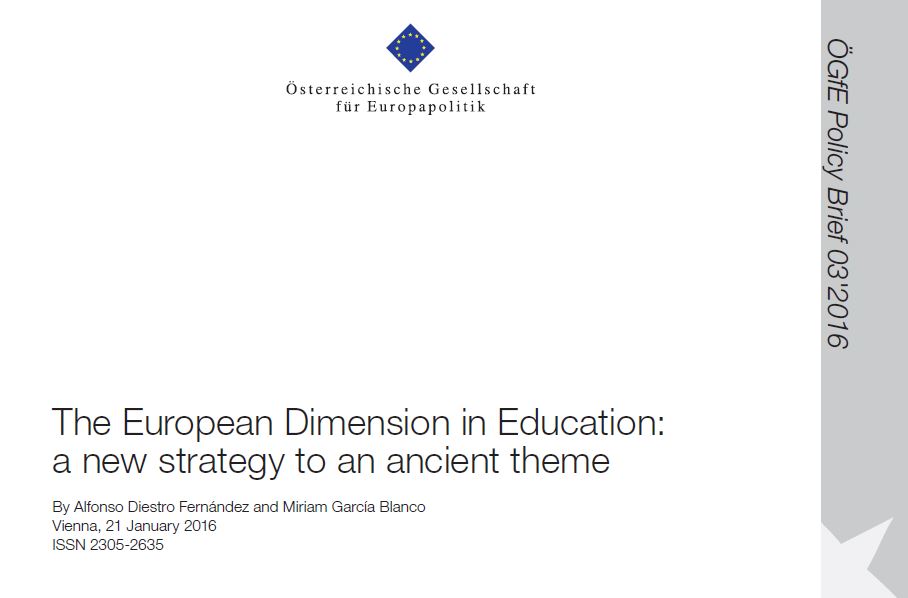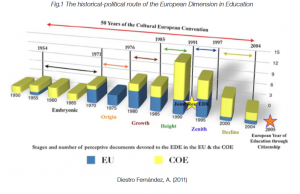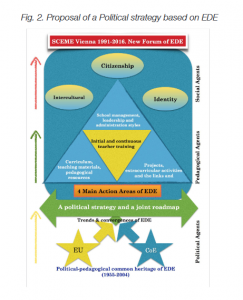Policy Recommendations
- Restoring the political and pedagogical heritage of the European Dimension in Education in the European Union and Council of Europe. It should be the core of political and social debate.
- The European Parliament and the European Commission must increase the pressure on the Member States to work out new and more solid commitments in education.
- The overall aim must be to strengthen the sense of European identity in young generations and teach them the advantages and challenges of European citizenship.
Abstract
The European Union must reinvent itself in one of the weakest institutional, political and social moments of its recent history. It has to find innovative political and social strategies capable of reorienting the European debate towards other key dimensions of the political process, beyond economic needs. The aim is to achieve a stronger Union through ideas that will contribute to the stability of the project. We, therefore, propose a joint political strategy of the European Union together with the Council of Europe, fostering the European Dimension in Education.
The European Dimension in Education is an original concept of the educational policies of the European Union and the Council of Europe, which never had the approval of the Member States. It is an idea that has had certain importance in politics, considered as a pro-European educational trend, but has had very little impact on real actions and policy. Consequently, a political strategy and a joint roadmap should be established together with Member States. Four main areas of action and three main elements, as well as the launching of a document within the existing regulatory framework, supporting these political and pedagogical trends are suggested.
****************************
The European Dimension in Education: a new strategy to an ancient theme
1. Introduction
Europe, as a joint project, is facing one of the severest challenges in its recent history. Actions taken so far have not been sufficient to solve the existing challenges reliably yet. The current situation, therefore, requires committed, innovative and joint solutions from all Europeans. This means that a different set of social policies needs to be established, proper attitudinal and cognitive tools have to be transmitted and a “European dimension” needs to be introduced into the education system. Only this can lead to true citizenship and identity beyond the shared economy and currency.
Therefore, we need to find innovative joint solutions to the shared problems, which affect the European geopolitical context, including the members of the European Union (EU, 28) as well as those of the Council of Europe (COE, 47). This means that even though each Member State has its own viewpoints on the role of education in the European project, political actions need to be unified on the basis of the common heritage in order to support Europeanism in educational policies and to place it at the core of the political and social debate of the highest institutions.
2. A joint strategy based on the European Dimension in Education’s common heritage
Both organizations have developed an original cooperation policy on education for several decades. The nature of the political cooperation in education is generally subsidiary in the case of the EU, while voluntary and intergovernmental in the COE. Hereunder we propose a political strategy devoted to the European Dimension in Education (EDE). The aim is to involve both organizations (and their political, pedagogical and social agents) in educational issues and establish a political and pedagogical roadmap, focusing on four main action areas and three key elements of the EDE. Even though the concept is not totally new, it is quite innovative and daring. In the end, we need more education in order to confront the rise of radicalism, intolerance, xenophobia, euro-scepticism, euro-phobia, and the like.
[zitat inhalt=”In the end, we need more education in order to confront the rise of radicalism, intolerance, xenophobia, euro-scepticism, euro-phobia, and the like.”]
The efforts undertaken by the COE and EU in education matters are worth being highlighted. Although there have been many deliberations and proposals, very few real agreements could be achieved. This means that no serious commitment has been reached yet to improve and increase the political and intergovernmental cooperation in terms of education, neither have the principles on which this original policy is based, been reviewed; and the necessary resources for a correct practical implementation, according to the recent geopolitical and social changes and needs, have not been provided either.
Fig.1 The historical-political route of the European Dimension in Education
Diestro Fernández, A. (2011).
The EDE is the pro-European essence that should infuse all the political actions in terms of education. It is considered an unavoidable need, focused on the idea of education to, for and about Europe. The analysis of its trends[1] (Fig. 1), convergences and historical and political processes reveals that the EDE can develop a system of attitudes and intellectual approximations that rest on pluralism, tolerance, receptivity towards others, and the development of individual abilities such as the capacity for synthesis, critical analysis and personal judgement. It represents the assumption of a new philosophy in educational policies that must have a real impact on the whole educational system (curricular and extracurricular). Consequently, our aim is to recover the political and pedagogical common heritage acquired by both organizations and establish a process of analysis and re-thinking, thus allowing an updated implementation as well as new commitments. EDE could be the first step to the critical and participative citizenship in Europe and the shared targets derived from it, would be the following (Diestro y Valle, 2015: 111):
- To strengthen the sense of European identity in young generations.
- To clarify the value of civilization and of European citizenship in two dimensions: political (being a citizen) and psychological (feeling like a citizen).
- To prepare young generations to take part in Europe’s economic, social and cultural development.
- To develop in young generations an awareness of the advantages, challenges and obstacles this may bring.
- To improve their knowledge, favour the image of Europe and instil the meaning and value of the undertaken cooperation.
- To offer opportunities to improve quality in education.
- To favour shared principles and values, individual liberties and Democracy.
3. Four main action areas and three key elements
The political strategy and the roadmap proposed (Fig. 2) by the political agents must lead to the definition of the main action areas and the key elements proposed by the pedagogic and social agents. There are four main action areas where the EDE can develop its attitudinal and instrumental aspects, based on the paradigm of key competences and lifelong learning (Diestro Fernández, 2014: 6-9). Each action area requires several commitments of all the actors (European Institutions, Members States, European countries, NGOs, pedagogical and social agents, etc.).
I. The initial and continuous teacher training
The introduction of the EDE in teacher training is a key element that must be carried out in educational centres. The EDE must be included not only during the early stages of training but, because of its dialogic and critical nature, it must also be constantly updated through continuous teacher training. Furthermore, it is fundamental to cater for the existing diversity among the teaching staff (regional, local, etc.). Therefore, it must be adapted to the context and its particular needs. In this context it can be helpful to build on the achievements of the Bologna Process.
II. Inclusion in the curriculum, teaching materials, pedagogical resources and teaching
The political sphere has been reluctant towards the inclusion of the EDE as a new subject in school curricula, and there has not been a consensus yet, not even among the most convinced pro-Europeans. Therefore, it is necessary to change the methodological paradigms in the educational centres towards interdisciplinary and transversal perspectives integrated in education: formal, non-formal and informal. In other words, it needs to be done at a curricular level in the syllabus, in the pedagogical programmes and materials and in an extracurricular dimension, considering the whole as a reality.
III. Projects, extracurricular activities and links and exchanges between schools
There is a need to encourage a real policy to support school exchanges, as these become a key element for the mutual understanding in a multicultural society. To achieve effective results, these experiences must rely on teacher training, as they are the main actors in their implementation. The benefits of these actions are many: they consolidate the flow and exchange of information among teachers; they enable the exchange of teaching methodologies that favour a good practice of the EDE. In the same way, students and their families will benefit from these exchanges taking part in them and allowing them to learn first-hand about other realities, cultures and different ways of acting. European Institutions must also promote programs (and implement new ones) in the informal dimensions of education. Additionally, more resources and funds, for example, to democratize the e-twinning program in all schools of Europe need to be provided.
IV. School management, leadership and administration styles at schools
It is essential to involve the whole school community in the implementation of the EDE, as it leads to changes in schools and their organizational structure. Therefore, it becomes necessary to provide schools with greater management autonomy, decentralizing and transferring processes towards local councils and local institutions, opening schools to the community they belong to. Leadership in education is an essential aspect in the development of the EDE as it is part of a strategy to improve education, providing an adequate initial and continuous training of the teaching staff in order to make teaching an inviting choice as a professional career. Educational establishments should open their doors to the local context, agents and families; and the Nationals Ministries should promote the real decentralization of the school competences towards the main agents.
However, all these political and pedagogical action areas that try to introduce the EDE, represented by different pedagogical programmes, always need to pay attention to three key elements: a) Identity: from a euroglocal perspective and open to the world; b) Intercultural: interaction between cultures and united in diversity, supported by local cohesion, moving beyond multiculturalism; c) Citizenship: regarding the political and legal status of the active and participatory democracy, teaching and training pro-active European citizens[2]. The EDE refers to how to be, how to think and how to feel as Europeans. Consequently, its character is inclusive and open to the world.
The EDE refers to how to be, how to think and how to feel as Europeans.
European Institutions must promote these three elements of EDE in search of greater socio-political and structural cohesion, which ultimately leads to an integration project whose main aim is keeping peace in Europe. Schools must become the epicentre of diversity and Europeanism, benefiting from the richness of the closest local context.
Fig. 2. Proposal of a Political strategy based on EDE.
4. Conclusions
The political strategy and its roadmap require a firm commitment of the Member States, the institutions and the agents involved in the process. It is surprising to see that since 2005, the European Year of Citizenship through Education, no particular attention has been paid to these relevant issues by European Institutions[3]. In fact, it would be very positive to benefit from the 25th Anniversary of the 17th Standing Conference of the European Ministers of Education, (SCEME, Vienna: 1991)[4], held jointly by the COE and the EU, and to revitalize it as a Pan European Forum on Education. That was a milestone of a joint process of analysis, re-thinking and convergence between both organizations, resulting in the joint Resolution nº1/1991[5] about EDE (COE, 1991). The institutional convergence obtained there and the joint processes are the essence that we need to recover today. Teachers, pedagogues, NGOs, the civil society and the social and pedagogical agents always have been committed to the EDE movement and if they are called to a joint summit, they will participate. But, only the European Institutions (EU+COE) could organize a process like this.
Consequently, the process could be emulated and a conference of similar characteristics could be held, as a reference enclave of the roadmap. To sum up, this is about the recovery, demand and claiming of the regulatory and theoretical framework corpus achieved by the EDE for over sixty years in both organizations, thus constituting a main reference for the analysis and re-thinking that could be the re-foundation of a Pan-European movement through EDE, in line with the characteristics of the 21st Century.
The main obstacle is to persuade the Member States to overcome the tension between the growth of nationalist trends and the promotion of Europeanism.
The main obstacle is to persuade the Member States to overcome the tension between the growth of nationalist trends and the promotion of Europeanism. The European Parliament and the Commission must find new ways to make the subsidiarity principle and the exclusivity of the national competences in education more flexible. The subsidiarity principle has always been the main obstacle and it is not possible to promote subsidiarity and the EDE at the same time. It will not be possible to change the current outlook or the political vision in Europe, if the Member States deem that the inclusion of this idea could mean a lack of respect towards their national competencies. It will not be an easy way, but the States should understand that new times in Europe need new commitments and strategies. Therefore, the European Institutions must re-start the process and invite the European Ministers of Education to commit to make educational policies and systems more supranational.
The EDE, as strategy, could become the European Institutions’ political answer to the increase of nationalism, scepticism, radicalism and xenophobia in the Members States. 25 years after the Vienna Conference, it is time to promote a new strategy to an ancient theme, even a new joint resolution (or recommendation) about EDE – towards new principles of cooperation in education to make the European Space of Knowledge and Education through Lifelong Learning a reality.
[1] These analyses, conclusions and reflections refer to the analyses found in Diestro Fernández (2011). See bibliography. After 2005, the European institutions did not pay special attention to these relevant issues and did not release any further normative document about EDE.
[2] The importance of interculturality and citizenship to promote the European identity was analysed by the authors in García Blanco & Diestro Fernández (2013). See bibliography.
[3] However, interest for EDE and its awareness, understanding and attitudes is growing in certain national contexts, for example, in the new EU members like Croatia, as Turk et al. (2015) show in their research.
[4] All the internal documents of the 17th Standing Conference of European Minister of Education (1991) are filed in the Archives of the Council of Europe, reference COE: MED 17-1 to 17-6. See bibliography.
[5] Accesible in: http://www.coe.int/t/dg4/education/historyteaching/Source/Results/AdoptedTexts/Vienna1991Res1_en.pdf
- COE (1991). La Dimension Européenne de l’Éducation : pratique de l’enseignement et contenu des programmes. Conférence Permanente des Ministres Européens de l ́Éducation. 17th session Vienne, 16-17th October 1991. (Strasbourg, Conseil de l ́Europe). Ref. MED/17-1 à MED/17-6.
- Diestro Fernández, A. (2011). La Dimensión Europea en la Educación: Análisis comparado de su desarrollo en perspectiva Supranacional. Tesis Doctoral inédita. Salamanca, Universidad Pontificia de Salamanca.
- Diestro Fernández, A. (2014). The future of European education: A political strategy & four action areas. European Journal of Futures Research, 2(1): 1-10. doi: http://dx.doi.org/10.1007/s40309-014-0049-2
- Diestro Fernández, A. y Valle López J. M. (2015). Towards a European Supranational Policy of Education based on the European Dimension on Education. Bordón. Revista de Pedagogía, 67(1), 101–116. doi: http://dx.doi.org/10.13042/Bordon.2015.67107
- García-Blanco, M. y Diestro Fernández, A. (2013). Ciudadanía e interculturalidad. Elementos claves en la construcción de la identidad europea. Interacções, 9(23): 2-29. http://revistas.rcaap.pt/interaccoes/article/view/2816
- Turk, M., Miočić, I., Marinović, M., Turković, I., & Ledić, J. (2015). Croatian Students’ Awareness, Understanding and Attitudes Regarding European Dimension in Education. Procedia-Social and Behavioral Sciences, 174, 862-869. doi: http://dx.doi.org/10.1016/j.sbspro.2015.01.700
ISSN 2305-2635
The views expressed in this publication are those of the authors and not necessarily those of the Austrian Society of European Politics or the organisation for which the authors work.
Keywords
European Dimension in Education; European Union; Council of Europe; European Policies of Education; Europeanism
Citation
Diestro Fernández, A., García Blanco, M. (2016). The European Dimension in Education: a new strategy to an ancient theme. Vienna. ÖGfE Policy Brief, 03’2016










